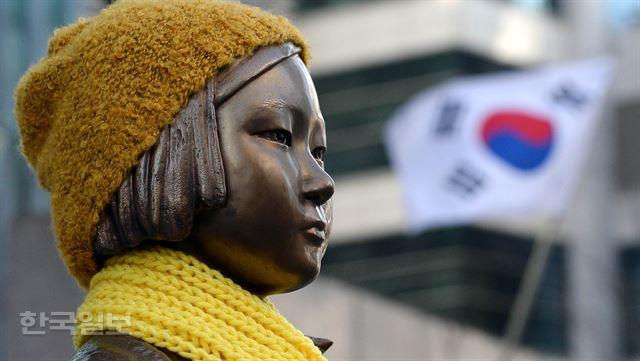
Japanese military comfort woman statue installed in front of the Japanese Embassy in Seoul, Junghak-dong, Jongno-gu. Hankook Ilbo data photo
Japanese military comfort women victims won the first trial in a lawsuit for damages against Japan. This is the conclusion five years after the formal trial began.
The 34th Division of the Civil Agreement of the Seoul Central District Court (Director Jeong-Gon Kim) held the first trial of a lawsuit filed against the Japanese government by 12 people, including the late Chun-hee Bae, against the Japanese government, and ruled over the plaintiff.
The judge said, “(Japan’s) tort is recognized, and plaintiffs seem to have suffered physical and mental pain that is hard to imagine,” and said, “I quote all plaintiffs’ claims.”
In August 2013, Grandma Bae and others filed for a civil arbitration with a Korean court demanding compensation of 100 million won per person against the Japanese government. They insisted, “Compensate for damages for illegal acts that were selected as comfort women by using violence or deceived during the Japanese colonial rule.”
However, as the Japanese government did not comply with the mediation process, the case went to a formal trial in December 2015. Even after the formal trial began, Japan’s repeated refusal of service of the complaint resulted in the first trial being held only in April of last year, about four years after the lawsuit was filed through public service procedures.
The biggest issue in this trial was the court’s judgment on the principle of waiver of sovereignty. The Japanese government has so far refused to comply with the trial due to the principle of sovereign immunity, which is a principle under international law that states that “the act of one country cannot be judged by another country in its own court.
Attorney Kim Kang-won, who represents the victims, asserted an exception, saying, “(During colonial period) Japanese acts are illegal acts against human rights and are international crimes, so sovereign immunity (state immunity) cannot be applied.”
On that day, the court also said, “It is possible to exercise jurisdiction,” saying, “It is not possible to recognize the state immunity to the part that violates international enforcement norms as an anti-human act.”

Japanese comfort women victims’ compensation diary
Choi Na-sil reporter [email protected]
You can also view the news Naver Et edited by the Hankook Ilbo.

